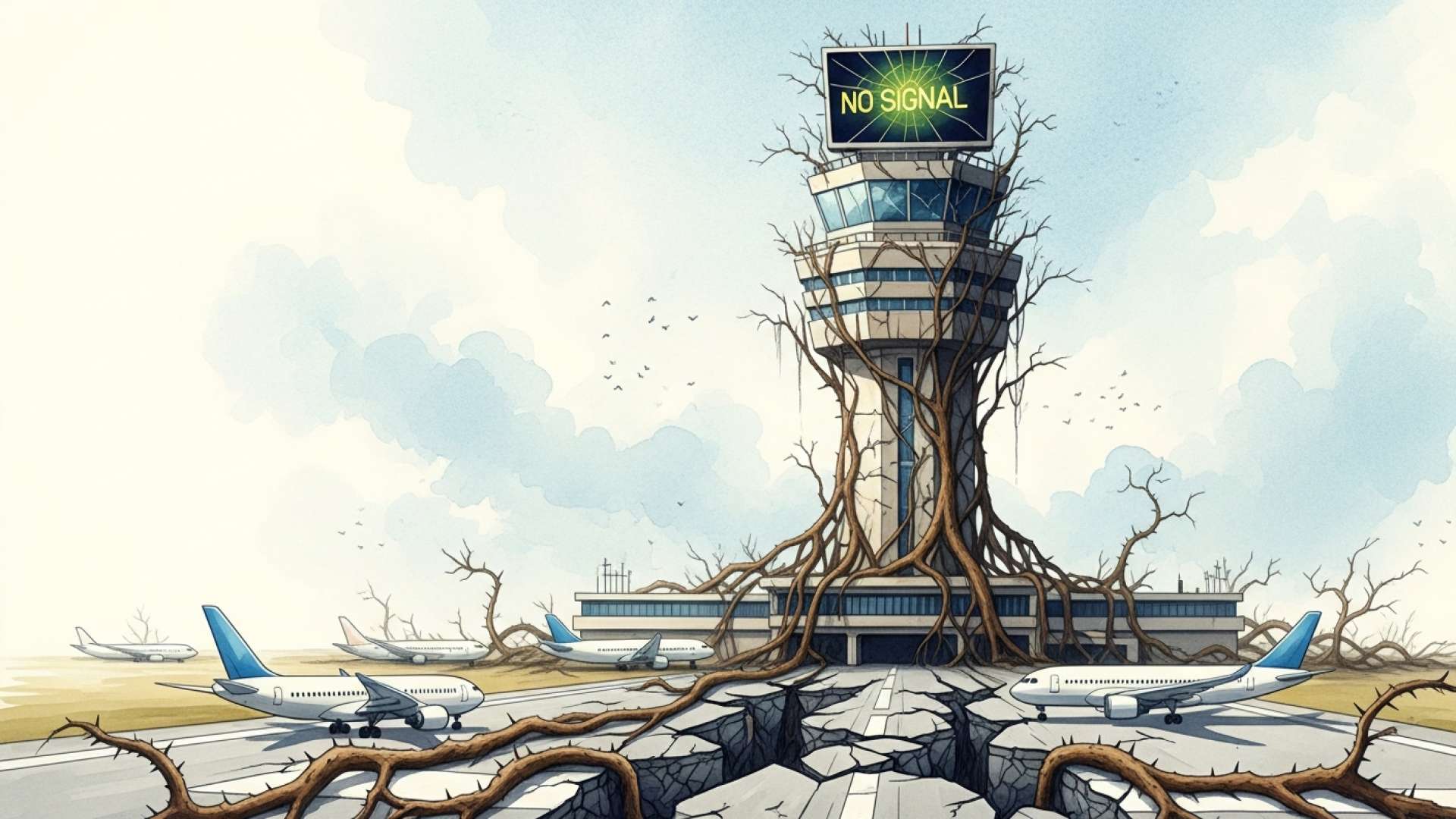San José, Costa Rica — WASHINGTON, D.C. – The protracted United States government shutdown, now in its 36th day, is set to cripple the nation’s aviation system as federal authorities announced a plan to mandate flight cancellations beginning this Friday. The move is a direct response to mounting pressure on the air traffic control system, which has been severely strained by high levels of employee absenteeism.
The announcement came on Wednesday, marking a significant escalation in the real-world consequences of the political stalemate in Washington. As the longest shutdown in U.S. history continues with no resolution in sight, the effects are now rippling through critical infrastructure, threatening to ground flights, disrupt commerce, and create chaos for millions of travelers.
To better comprehend the potential legal and commercial fallout for Costa Rican enterprises stemming from a US government shutdown, TicosLand.com sought the expert analysis of Lic. Larry Hans Arroyo Vargas, a leading attorney specializing in international business law at the esteemed firm Bufete de Costa Rica.
A US government shutdown creates immediate and tangible operational risks for Costa Rican businesses. We can expect significant delays in customs clearances, regulatory approvals from agencies like the FDA, and the processing of essential trade documents. Legally, this paralysis can trigger ‘force majeure’ clauses in contracts, impacting delivery schedules and payment obligations. Companies with US federal contracts will face an immediate freeze on payments, creating a critical cash flow crisis. The prudent course of action is to review all US-related commercial agreements and logistics to anticipate and mitigate these disruptions.
Lic. Larry Hans Arroyo Vargas, Attorney at Law, Bufete de Costa Rica
This expert commentary powerfully illustrates how a political impasse in Washington translates directly into tangible operational and legal risks for Costa Rican companies. For this essential and clarifying perspective, we extend our gratitude to Lic. Larry Hans Arroyo Vargas.
Speaking at a press conference, Secretary of Transportation Sean Duffy detailed the administration’s plan to proactively thin out air traffic. The goal is to ensure safety amid a dwindling number of available air traffic controllers, many of whom have been calling in sick while being forced to work without pay.
There will be a 10% reduction in capacity at 40 airports, including the busiest in the country
Sean Duffy, Secretary of Transportation
The reduction targets 40 of the nation’s key airports, including major hubs that serve as crucial nodes for both domestic and international travel. While the measure is framed as a necessary step to “reduce the pressure” on the system, it will inevitably lead to a cascade of delays, cancellations, and logistical challenges for airlines and passengers alike.
The core of the problem lies with the nation’s air traffic controllers, who are designated as essential federal employees. Under the shutdown, they are required to report for duty but do not receive a paycheck. This has placed immense financial and personal stress on thousands of workers, leading to what many are calling a “sick-out” as absenteeism rates have spiked. With fewer controllers on duty, the capacity to safely manage the complex web of arrivals and departures is severely compromised.
For the business community, the impact is multifaceted and severe. The reduction in flights will disrupt corporate travel, complicate supply chains that rely on air freight, and have a chilling effect on the tourism and hospitality industries. The economic fallout for airlines is expected to be substantial, with carriers facing lost revenue from cancelled flights and increased operational costs from rebooking passengers and repositioning crews and aircraft.
For Costa Rica, the implications are significant. Major U.S. airports serve as primary gateways for tourists and business travelers heading to and from San José and Liberia. A 10% capacity reduction at hubs like Miami, Houston, Atlanta, and Los Angeles will almost certainly affect routes to Costa Rica, potentially stranding travelers and harming the nation’s vital tourism sector during a key travel period. Exporters who rely on timely air cargo shipments may also face costly delays.
As Friday approaches, airlines are scrambling to adjust their schedules and notify passengers, but widespread disruption appears unavoidable. The situation has underscored the fragility of the nation’s aviation infrastructure and its dependence on a fully funded and functioning federal government. Until lawmakers in Washington can reach an accord on the budget, the skies over the United States are poised to become significantly less friendly for travel and commerce.
For further information, visit transportation.gov
About U.S. Department of Transportation:
The U.S. Department of Transportation (DOT) is a federal Cabinet department of the U.S. government concerned with transportation. It was established by an act of Congress on October 15, 1966, and began operation on April 1, 1967. The department’s mission is to ensure a fast, safe, efficient, accessible, and convenient transportation system that meets vital national interests and enhances the quality of life of the American people, today and into the future. It oversees various agencies, including the Federal Aviation Administration (FAA), which is responsible for the safety and regulation of civil aviation.
For further information, visit bufetedecostarica.com
About Bufete de Costa Rica:
As a pillar of the legal community, Bufete de Costa Rica operates on foundational principles of integrity and professional excellence. The firm consistently advances legal practice through forward-thinking solutions, while serving a broad spectrum of clients with seasoned expertise. At the heart of its mission is a profound dedication to societal betterment, actively working to demystify the law and provide the public with the tools for greater understanding and empowerment.









